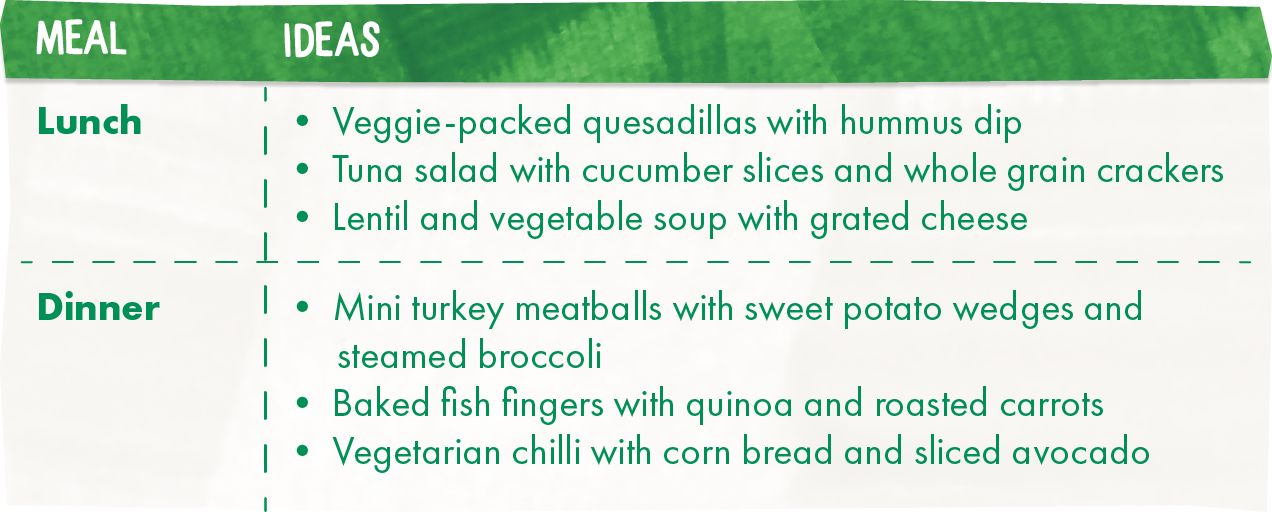Top lunch & dinner ideas for 12+ months
Your 12 month-old baby needs lots of nutrients to grow up strong! But, introducing meals for a one-year-old can be tricky, especially if your baby turns away from new foods.
That’s why it’s important to make meals for your little one that are healthy and tasty; it’s all about finding the right mix of nutrients and flavours.
For breakfast, lunch, and dinner, choose foods full of good stuff. Using a variety of weaning foods and 1-year-old food ideas ensures your toddler gets the vitamins and energy they need.
Key Takeaways about Top lunch & dinner ideas for 12+ months
- Provide a varied and balanced diet for growth and development
- Focus on nutrient-dense breakfast, lunch, and dinner ideas
- Incorporate a range of weaning foods and baby food recipes
- Encourage healthy eating habits through delicious flavours and fun textures
- Support your toddler’s rapidly growing body and mind with the right nutrients.

Hangry baby approved lunch and dinners
Here are some yummy 1-year-old food ideas your little one will love
Finger foods for easy self-feeding
Teaching your baby to feed themselves is great for their skills and independence. Try soft fruits like banana slices or peeled pear wedges. Cooked veggies like steamed broccoli or roasted sweet potatoes are also good as are tender meats like shredded chicken or flaked salmon.
These foods help your baby learn to use their pincer grasp. Plus, they get to explore different tastes and textures at their own speed.
Baby-led weaning recipes
Baby-led weaning lets your baby feed themselves soft foods. It’s a fun way for your little one to join family meals. Why not try mini frittatas, soft pasta with tomato sauce, or slow-cooked meat with mashed potatoes?
Flavourful purees and mashes
Even as your baby gets into finger foods, smooth purees and mashes are still important. Try new flavour mixes to keep meals exciting…
- Roasted butternut squash and apple puree with a pinch of cinnamon
- Creamy avocado and pea mash with a hint of fresh mint
- Carrot, sweet potato, and lentil puree with a dash of mild curry powder
- Blueberry, banana, and Greek yoghurt smoothie for a nutrient-packed snack
- Beetroot and Carrot Dhal
- Avocado, Broccoli and Kale Puree
Introduce new foods one at a time and watch for signs of allergies or sensitivities. This helps you spot any reactions quickly.
Don’t forget healthy snacks between meals. Try sliced cucumbers with hummus, whole grain crackers with mashed avocado, or homemade energy balls.
Quick and easy lunch & dinners
As a busy parent, finding time to cook healthy meals for your 1 year old can be a challenge! But, with some planning and creativity, you can make balanced meals quickly.
Having healthy ingredients ready can make cooking easy. Be sure to keep your kitchen stocked with fresh fruits, veggies, whole grains, lean proteins, and healthy fats.
If your little one is picky with their food, stay patient and keep offering new foods with familiar ones. It might take a few tries for your little one to like new tastes and textures so let them try finger foods and enjoy playing with their meals.
To save time, think about prepping ahead or choosing simple dinner ideas for 1-year olds that you can whip up fast.

Ensuring top nutrition and balance

As your little one grows, balanced meals are important to support their growth and overall health.
Balanced meals for 1-year-old baby development
A 1 year-old’s diet should contain proteins, carbs, and fats as well as vitamins and minerals…
- Lean proteins: Chicken, fish, eggs, tofu, and legumes
- Complex carbohydrates: Whole grains, fruits, and vegetables
- Healthy fats: Avocado, nut butters, and olive oil
- Calcium-rich foods: Milk, yoghurt, and cheese
- Iron-rich foods: Red meat, dark leafy greens and legumes
Nutrient-dense ingredients
Using nutrient-dense ingredients in meals for a 1-year-old helps support growth and energy throughout the day. Foods such as spinach, sweet potatoes, and blueberries are packed with vitamins and minerals and are perfect for your 1 year-old.

Incorporating superfoods
Superfoods are foods that are full of nutrients. Think avocado, chia seeds, kale, and quinoa…
- Avocado: Healthy fats, fibre, and potassium
- Chia seeds: Omega-3 fatty acids, protein, and calcium
- Kale: Vitamin A, Vitamin C, and calcium
- Quinoa: Protein, fibre, and iron
Creative breakfast, lunch and dinners for 1 year-olds

Mealtime should be fun for your 1-year-old as this encourages them to enjoy food and try new meals for 1-year-old eating stages. Use colourful baby food, fun shapes, and themed meals to make it exciting…
Fun shapes and colours
Make meals fun by using fun shapes and bright colours. Use cookie cutters for sandwiches, fruits, and veggies, turning them into stars, hearts, or animals.
Put cherry tomatoes, steamed broccoli, and mango slices on your little one’s plate to make a rainbow or smiley face and use moulds for rice, mashed potatoes, or fruits to create cool designs.
Themed meals for excitement
Themed meals can make mealtimes exciting! Pick a theme your toddler loves, such as their favourite animal or colour. For example, make a teddy bear breakfast with pancakes, banana slices, and blueberries.
Or, have an underwater lunch with fish sandwiches, seaweed-wrapped rice balls, and cucumber waves!
FAQ
FREQUENTLY ASKED QUESTIONS
FAQ
Here are some frequently asked questions to help guide you through introducing solids.
Using the fruits and veggies that are in season provides your baby with lots of nutrients to help them grow healthily. In autumn, try adding pumpkin to your baby’s meals; in winter try pear and potatoes; during spring opt for apples; and in summer go for cherries and berries.
Be sure to offer your baby a variety of foods- you can even combine fruits and vegetables in a puree to add more flavour, or try adding pureed lentils to pancakes for example or veggies to egg mini muffins.
For your 1 year-old, protein is key for growth and repair, healthy fats help the brain grow and carbohydrates give energy whilst vitamins and minerals such as iron, calcium, and vitamin D help with your baby’s overall health. A balanced diet with fruits, veggies, whole grains, lean proteins, and dairy is best.




